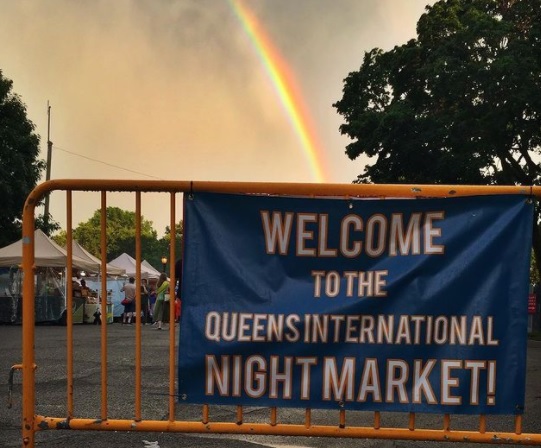
Queens Night Market (Instagram April 2019)
Jan. 12, 2021 By Christina Santucci
Organizers of the Queens Night Market have announced plans to return to Flushing Meadows Corona Park this spring after last year’s event was cancelled due to COVID-19.
“In order to open in April, we have to start the process now. We are going to target April 17 and keep our fingers crossed,” the event’s founder John Wang said.
The market is tentatively scheduled to run through October 30 in the outdoor grounds of the New York Hall of Science, and the first two Saturday nights may serve as ticketed “sneak previews” for the event as has been the case in previous years.
This year, organizers plan to monitor COVID-19 numbers and the vaccine rollout in the city throughout the planning process.
“Hopefully when we do reopen this year there are no capacity restrictions,” Wang said. Items sold at the market will be capped in price at $5 with a few $6 exceptions, therefore vendors rely on a large volume of sales to make a profit. In 2019, the event averaged 15,000 visitors per night with occasional evenings drawing 20,000 to 25,000 people.
“People are itching so much to get out and do social events, and hopefully we have become some positive aspect of New York City, and people will be excited to come out,” Wang said.
So far, about 50 vendors have been selected to dish up international offerings at this year’s market, and applications for stalls will be accepted on a rolling basis.
After the event was cancelled in 2020, the Queens Night Market channeled efforts into helping provide meals to healthcare workers in Queens, assisting with a borough-wide census drive, and serving up food at a fundraiser for the Alliance for Flushing Meadows Corona Park. Six of the Queens Night Market’s vendors also sold their dishes at an outpost in Rockefeller Center in the fall.
However, the pandemic also appears to have taken its toll on independent food sellers in Queens. Wang estimated anecdotally that between 50 to 75 percent of the 2,000 aspiring entrepreneurs associated with the market appear to have closed down or paused their businesses.
“Part of it is practical. If they are so worried about making and paying rent, they are probably not able to use their savings to start a business,” he said.






